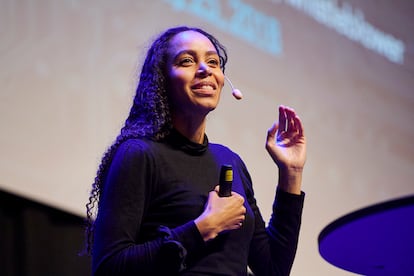The entrepreneur who wants to decolonize artificial intelligence in Africa
South African data scientist Pelonomi Moiloa is the founder of one of the continent’s first companies that develop AI-based products


Those who visit the website of Lelapa AI are greeted by the phrase: “AI for Africans, by Africans, solving African problems.” The co-founder and CEO of this company —one of the first in the continent devoted to the development of artificial intelligence products — is Pelonomi Moiloa, a data scientist who is very concerned about producing technologies with a seal of origin that improve lives in the African continent.
This young researcher, who was included among Time magazine’s 100 most influential people in artificial intelligence in 2023, began her career with a double major in biomedical and electrical engineering at the University of the Witwatersrand, in her native South Africa, before moving to Japan in 2016 to earn a master’s degree at Tohoku University. It was there that she decided to focus on AI, researching the application of deep learning (one of the branches of artificial intelligence) for neurophysiology. Back in South Africa and due to practical reasons, she focused her professional work as a data scientist on the financial sector for eight years, until her concerns and her contact with other experts became strong enough to bring her company to life.
“Lelapa AI was founded because experience has shown us that when we import models developed in the West to deploy them in the African context, they often fail. Sometimes, this technology not only doesn’t work, but it is harmful,” explains the entrepreneur. The risks detected in AI biases in the rest of the world, she emphasizes, are even more dangerous in Africa. For example, “the legacy of apartheid in South Africa has caused certain people to live, mostly, in certain areas. Therefore, when you use location in a credit model to determine whether someone is eligible for a mortgage loan, race may actually come into play,” she says. “A bias in that sense has not been introduced, but the model learned it with the information that was provided to it.” With these mechanisms, she believes, technology absorbs social prejudices and perpetuates “power structures and violence, and with them, discrimination.”
To fight these biases, the founder of Lelapa AI is committed to a constructive approach: “There is a very conscious process about what type of data we put into the machine. Instead of having a ChatGPT that looks at the entire internet and includes all the terrible opinions that we don’t want to know, we are able to moderate, to a certain extent, what this machine is exposed to. It’s strange, because we are deciding what we think is right and what is wrong, but this means that there is a filter that we train the machine with, which includes parts of our culture and our heritage.” Moiloa refers to the introduction of African languages in the training of AI language models, but also to the content that has to do with the philosophies and worldviews of the continent.
One of her main concerns is ending the invisibility of African languages in technology, something which various scientists have warned about and which African linguists and technologists are trying to change. “We need our languages to be represented, because they have a huge variety of specificities and nuances,” she says. That is one of Moiloa’s greatest interests: that technology is developed in a context that highlights the cultural wealth of the continent. “We need to decolonize technology and align it with the record of our history, our languages and the data we use to feed these tools.”
This is why Lelapa AI started with the VulaVula project, which is focused on an area of AI known as Natural Language Processing, which is the technology used, for instance, in machine translation systems or voice assistants, and that allows a machine to “understand” a certain language. VulaVula offers linguistic support for any automated service in underrepresented languages, starting with Zulu, Xhosa, Sesotho and Afrikaans. The applications of this technology range from access to public information to customer service for companies oriented to the South African market.
This expert demands attention to all “malicious uses of AI”: tech that helps produce fake news, but also that creates such a large amount of content that it becomes impossible to distinguish the good information from the bad. But what worries her most is the more material aspect.
“Again, many of the natural resources for producing this new technology are in Africa. The European Union, for example, has African countries like Guinea, the Democratic Republic of the Congo or South Africa among its main suppliers of raw materials that are considered critical, such as bauxite [a source of aluminum] or tantalum [to produce electronic equipment], iridium, ruthenium or rhodium. We know that, for more than 100 years, Africa has been plundered to extract our resources, to make them as cheap as possible. And thinking that those resources are going to be even more valuable worries me a lot. There will be international actors interested in promoting instability. I don’t know how we can protect ourselves from that, but we must,” Moiloa warns.
Optimistic about Africa and AI
Pelonomi Moiloa is well aware of the pitfalls of technology and, specifically, AI. Still, she prefers to consider herself enthusiastic. She mentions its use to stop the locust invasion that devastated the Horn of Africa in 2019; or for farmers to monitor pests with their mobile devices; the South African MomConnect initiative, which improves access to healthcare for pregnant women; its use in microfinance or in the payment and money transfer methods that are widespread in the African continent; in addition to the experience in secondary education in South Africa, as a method of school reinforcement.
“I am very excited about Africa,” she says, convincingly, although she acknowledges that there are challenges such as internet connection, energy production or the reach of technology in remote areas. Still, for Moiloa, the continent can be an example: “The African experience can be a model for the rest of the world, showing that huge machines, which require a lot of energy and millions of dollars of investment, are not necessary to create something significant. Also that there are genuine human needs, not only pure entertainment or ego validation, that can be met with real, tangible solutions.”
She is conclusive: “I honestly believe that AI has the potential to help make the future better for more people. There is no other choice. With problems like climate change, for example, and social instability, affecting everyone, we need tools to help humans be better humans. AI can do it, because it is a powerful tool. So I choose to be excited.”
The efforts of Lelapa AI and Moiloa are aimed at promoting a landscape of innovation for the entire planet. “Our way of understanding the development of technology considers the human species as part of the world and ensures that what we develop benefits the entire world. It has to do with applying indigenous concepts, with developing a technology that does not generate extractivism or exploitation, that takes communities into account and serves to connect people with each other.”
Sign up for our weekly newsletter to get more English-language news coverage from EL PAÍS USA Edition
Tu suscripción se está usando en otro dispositivo
¿Quieres añadir otro usuario a tu suscripción?
Si continúas leyendo en este dispositivo, no se podrá leer en el otro.
FlechaTu suscripción se está usando en otro dispositivo y solo puedes acceder a EL PAÍS desde un dispositivo a la vez.
Si quieres compartir tu cuenta, cambia tu suscripción a la modalidad Premium, así podrás añadir otro usuario. Cada uno accederá con su propia cuenta de email, lo que os permitirá personalizar vuestra experiencia en EL PAÍS.
¿Tienes una suscripción de empresa? Accede aquí para contratar más cuentas.
En el caso de no saber quién está usando tu cuenta, te recomendamos cambiar tu contraseña aquí.
Si decides continuar compartiendo tu cuenta, este mensaje se mostrará en tu dispositivo y en el de la otra persona que está usando tu cuenta de forma indefinida, afectando a tu experiencia de lectura. Puedes consultar aquí los términos y condiciones de la suscripción digital.








































